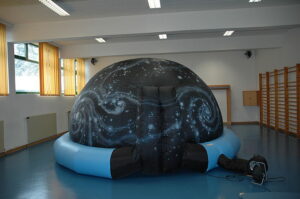Astronomy To Go: the travelling planetarium for schools
Where do you look when you’re out and about after dark? The street? The shopping windows? Your smartphone? Or up to the sky? Probably not the latter. I can fully understand that when you’re in a big city, because, let’s be honest, there isn’t much to look at. You might see the moon, Venus, a couple of bright stars. Maybe you’ll recognise the Big Dipper or Orion. But real star gazing is something, only few of us do frequently.

The Institute of Astrophysics at Vienna University wants to change that and came up with an great project: Astronomy To Go, a travelling planetarium. Its inflatable dome is quickly installed in a school, and students between 6 and 14 can explore the universe with a real astronomer.
I had the chance to try it out a few weeks ago at the Upper Austrian Environmental Congress – and loved it. Squeezing through a small opening, we entered a room like an igloo. Camping mats cover the ground, the little projector is in the center of the dome. Stefan Wallner, director of the planetarium, sits next to it on the floor, a keyboard on his lab. “Where do you want to go?”
The travelling planetarium is not like the usual planteriums in big cities like Vienna. The small room feels like a camp ground, and being so close to an expert on stars makes it easy to ask questions. The project is popular, right now schools can apply for a visit in March to June.
The idea came from the Institute of Astrophysics. The initial funding was provided by the Austrian Science Fond FWF, the Austrian Society for Astrophysics, and the institute itself. By now, demand is so high that the project is funded by a small fee paid by the school, approximately 3 € per student. It’s enough to cover the costs for staff and travelling.
But why would you need a mobile planetarium? Stefan Wallner believes that parents and teachers today don’t spark the children’s interest in the stars anymore, probably because they have lost it themselves. About 95% of the students have never seen a dark sky, and even more have never seen the Milky Way. When Wallner shows them a natural sky, they have no words.
The biggest problem, so Wallner, is that one of four Austrians lives in Vienna, where you can’t see many star. When people leave the city, they look at many things, but not into the sky. They have forgotten that something interesting is up there. But outside the bigger cities, “Austria has a premier sky”, says Wallner.

I want to know if he thinks that being interested in the stars is important. Wallner is convinced: “If we don’t have any light we wonder what is up there. Actually, we want to question all those objects up in the sky. Why are stars bright? Where are we within the vast space?” And exactly these are the questions asked by children outside the cities.
“Maybe the sky is an initiative to question everything, and when we stop questioning, we end up with situations like today.” One of those is the discussion about constant summer time. We have forgotten that our time is defined by the stars and our life is running on fixed trails. Humans are adapted to the natural day-night-cycle, and this makes sense.
But whatever philosophical ideas might be connected to the night sky, one thing is certain: the students love the star tour! Each time several students want to watch the real sky in the evening after the show. And in those places, where light pollution is too bright, students come up with a solution: the next family holiday, so they often declare, will be in an area with dark skies.
Maybe, so Stefan Wallner, Austria will soon have its very own Dark Sky Parks. There are enough areas that are dark enough to see the milky way. The next step will be to trigger the motivation for the paper work and the necessary investments in better light. The it will be easier for students to look up into the stars like millions of children their age have done since the beginning of mankind.
Homepage: https://mobilesplanetarium.univie.ac.at/
Contact: stefan.wallner@univie.ac.at
Title photo by Stefan Wallner
One Reply to “Astronomy To Go: the travelling planetarium for schools”
But real star gazing is something, only few of us do frequently.